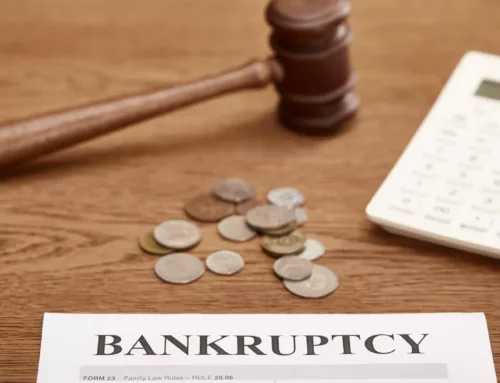When you fall behind on your mortgage payments, your lender may take ownership of the asset or property that you used as collateral and sell it as means of recovering the remaining balance. This process is called foreclosure. Foreclosure is the legal process by which a lender attempts to recover the amount you owe on a defaulted loan by taking ownership of and selling your mortgaged property.
The foreclosure process varies from state to state, but in general, most lenders are willing to negotiate with you to help you catch up on monthly payments and avoid foreclosure. A competent Wyandotte bankruptcy attorney can help you know and understand the process of foreclosure.
This article will explain the following things that you should and can do to avoid losing your home in foreclosure:
- Get Organized and Set Up a Case File
- Organize Your Financial Information
- Know Your Legal Rights
- Review Your Spending Habits
- Know Your Options
- Learn About the State Foreclosure Laws
- Contact Your Loan Servicer
- Seek Help From a HUD-Approved Housing Counselor
- Avoid Foreclosure Prevention Companies
- Sign a Deed instead of Foreclosure
- Sell Your Home
Get Organized and Set Up a Case File

- a record of all the payments you’ve made
- your monthly billing statements
- property tax information
- copies of any letters you sent to the servicer
- any correspondence from your servicer
- insurance information
- escrow statements (if applicable)
Organize Your Financial Information
Aside from arranging your documents, it is also important to consolidate your financial information. Your servicer will need this information to determine whether you’re qualified for an alternative to foreclosure. You need to collect the following documents that will verify your current financial status:
- proof of total monthly income
- list of monthly living expenses
- bank statements
- recent payslips
- profit and loss statement (if self-employed)
- federal tax return
- rental income
- alimony
- Social security benefits
Know Your Legal Rights
After gathering your loan documents, carefully review them so that you’ll know what your lender may do if you can’t make your monthly payments. Under federal law, your lender can’t start a foreclosure until you’re over 120 days delinquent in payments. Your documents and promissory note shall contain the following details:
- the amount of monthly late charges
- if you can reinstate the loan by catching up on the past-due amounts
- what other fees the servicer can charge (if you fall behind in payments)
Review Your Spending Habits
If you are struggling to make payments on your loan, one of the most important things that you need to do is to carefully assess your budget. You need to think of ways on how to reduce your monthly living expenses to be able to make your loan payments. You can cut off unnecessary expenses and focus only on basic and essential needs. In case there are certain expenses that you can’t get rid of such as credit card bills, you can try your best to negotiate for a lower payment.
Know Your Options
Generally, you have the access to temporary or permanent loss mitigation options to help you prevent foreclosure. A reliable Wyandotte bankruptcy attorney can help you determine your options to save your home or property from foreclosure when you file for bankruptcy. You have the following options to choose from:
1. Modify your loan
If you cannot make your monthly mortgage payment, you can try modifying the terms of your loan. Loan modification involves a change in the terms of your current loan. It can help you extend the length of your payment, reduce interest rates, or reduce monthly payments depending on your current financial situation. In addition, your loan servicer can add any amount that was past due to your loan balance. You can also qualify for a proprietary (in-house) loan modification or Freddie Mac or Fannie Mae Flex Modification, depending on your circumstances.
2. Request a forbearance
A mortgage forbearance agreement allows borrowers who are having temporary financial struggles to put a hold on their monthly mortgage payments for a certain period. During the forbearance period, you can use this time to reorganize your finances, get back on track, and pay off your accrued bills.
Learn About the State Foreclosure Laws
The foreclosure process varies by state. Each state has laws that govern the foreclosure process which includes the following:
- notices a lender must post publicly
- your legal rights and protections during the foreclosure process
- homeowner’s options for bringing the loan current and avoiding foreclosure
- timeline and process for selling the property
Contact Your Loan Servicer
As soon as you miss a payment, immediately contact your loan servicer to find out if you’re eligible for a foreclosure alternative. Do not delay until the last minute to get help. Deal with your problem at the soonest time possible.
Seek Help From a HUD-Approved Housing Counselor
The United States Department of Housing and Urban Development (HUD) funds free or very affordable housing counseling. Housing counselors can help you understand the law and your options, organize your finances, and represent you in negotiations with your lender.
Avoid Foreclosure Prevention Companies
You don’t have to pay hefty fees to seek help for foreclosure prevention. You can use that money to pay for the mortgage instead. There are several loan modification and for-profit foreclosure rescue companies that will excessively charge you in exchange for the information and services that can be provided for free by a HUD-approved housing counselor.
Sign a Deed in Lieu of Foreclosure
Sometimes, to avoid foreclosure, a lender will accept a deed in lieu of foreclosure. With this deed, you willingly transfer the ownership of your home to your lender and, in exchange, are released from your mortgage obligation. Doing so allows you to avoid an official foreclosure proceeding.
Sell Your Home
If none of the options works for you, the last resort to avoid foreclosure is to seek permission from your lender to attempt a short sale on your home. You sell your home for less than what you owe on it. The proceeds of the sale are paid to your lender, who then will typically forgive part or all of the remaining balance. The purpose of selling your home is to be able to pay off what you owe to your creditor. If you aren’t able to sell it for that amount, you may have to pay the remaining balance of the loan.
The Role of a Bankruptcy Attorney
The foreclosure process can be lengthy and complex. It may cause you financial hardship and difficulty in getting back on track. You need to be knowledgeable enough about the foreclosure laws that you need to strictly follow. If you’re facing an imminent foreclosure sale, do not hesitate to schedule a consultation with our experienced Wyandotte bankruptcy attorneys at Hammerschmidt Stickradt & Associates. Our lawyers will help you know your options to avoid or stop foreclosure. Contact our bankruptcy law firm to help you learn about the foreclosure laws in your state and your legal rights during a foreclosure.



